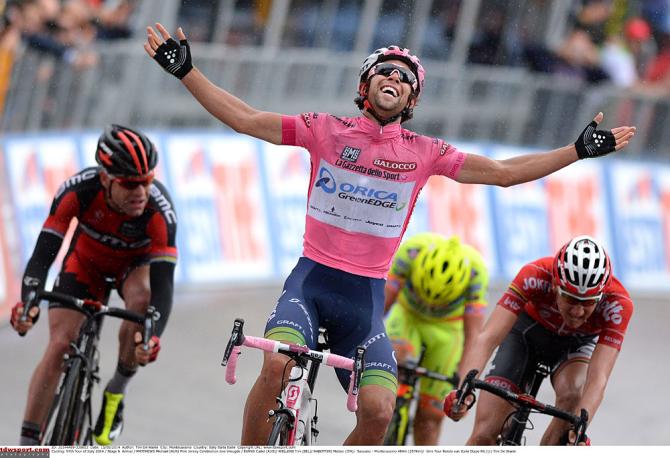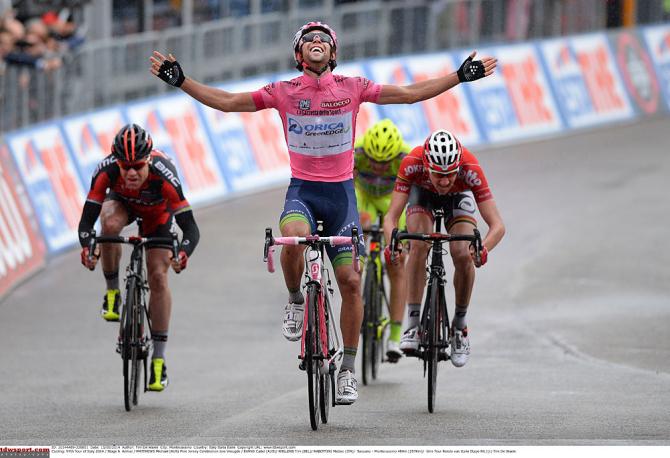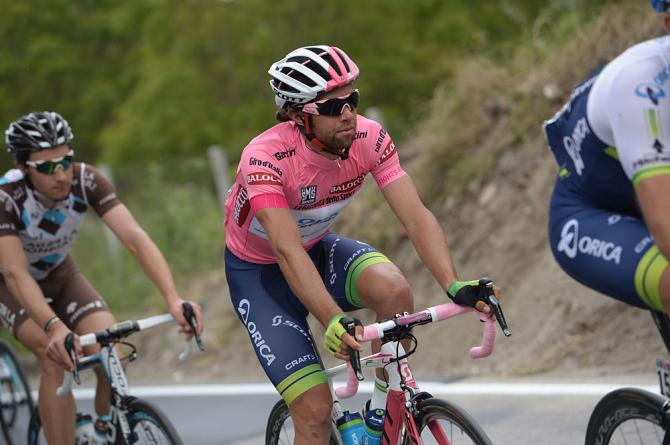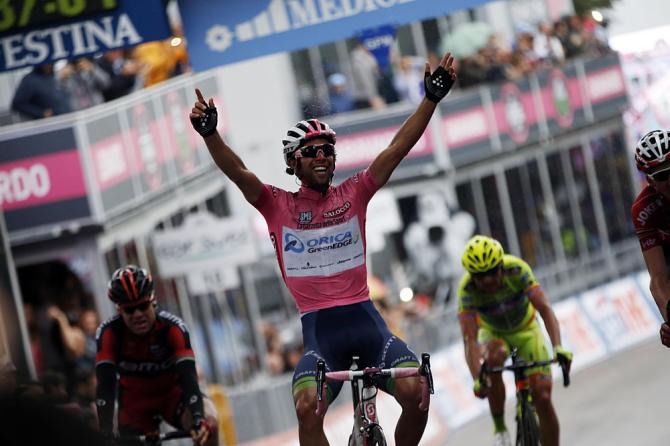Matthews strengthens Giro d'Italia lead with impressive stage win
Holds off Cadel Evans on final climb




An impressive climbing display by Giro d’Italia leader Michael Matthews (Orica-GreenEdge) both netted the Australian his first stage win in the Italian race and further reinforced the 23-year-old's grip on the maglia rosa.
Matthews could not have chosen a more appropriate day to clinch the win, given it is exactly 22 years since Michael Wilson took Australia’s first ever Giro stage in 1982, outsprinting double Tour winner Laurent Fignon and Italian rider Alfio Vandi in a three rider break at Cortona after a similarly long stage, 233 kilometres.
Orica-GreenEdge’s big initial objective in the Giro d'Italia was the team time trial, but since then Matthews has, as he says, "kept the pink ball rolling" in style. Matthews sixth place on stage five’s uphill finish at Viggiano was already impressive enough, but on stage six’s second category finish at Montecassino he upped his game even further.
The Australian first found himself on the right side of the huge crash with 11 kilometres to go with two teammates, Ivan Santaromita and Luke Durbridge in a group of around eight riders containing Cadel Evans (BMC Racing) and another two BMC riders.
Then when Evans accelerated hard with around a kilometre to go to the Montecassino summit, Matthews was able not only to stay on his wheel, but power past for the third Grand Tour stage victory of the career and Orica-GreenEdge’s second in this year’s race.
“Evans didn’t say anything to me, I thought we would have a little conversation on the climb so that I would take the stage and I would help him race for GC,” Matthews said in his post-race press conference.
“But we didn’t actually talk in the race, it was all for the win. He really wanted to win so did I, and it was fair play, it was a fair race in the end, and it was me against him for the jersey and for the stage.”
Get The Leadout Newsletter
The latest race content, interviews, features, reviews and expert buying guides, direct to your inbox!
“I was lucky to have very good legs after my team had put me in the perfect position at the bottom and I was able to deliver in the final.”
Given the final breakaway by Evans, Matthews and the half dozen other riders had emerged out of the crash with 11 kilometres to go, Matthews was asked if he agreed with BMC Racing Team’s decision to continue driving under such circumstances.
“I don’t think they really attacked,” Matthews argued, even if the tv images suggest BMC Racing’s lead trio of riders kept such a high pace that it was going to be difficult for anybody caught up in the crash to regain contact.
“But it’s not my team, so I can’t say anything about what they did. But I know that my team definitely didn’t ride, you never want to see a crash like that, and when it happens in that certain situation, everyone has their own plan.”
“Our plan was just to stay on BMC because I had the jersey and I had to try and conserve the jersey, but like I said, we played it cool, we had to be at the front to try and conserve the jersey, In the end that’s racing, so I can’t really comment about what another team has done.”
Overall Matthews now has a 21 second advantage over Evans, third on the stage, whilst the gap on his closest rival Rigoberto Urán (Omega Pharma Quick Step) has broadened from 19 seconds to 1:18. Solid gains for both Australians, then, but it seems very unlikely that the alliance between the two on the climb was anything other than circumstantial, though, given Matthews says he and Evans not only did not talk, they have barely communicated since he turned pro in 2011.
“I think we’ve actually talked maybe two or three times since I’ve been a professional, we don’t have anything to do with each other, unfortunately, I think he’s a really nice guy and everything, but we never really do the same sort of races, he’s more a GC rider and I’m more a sprinter;” Matthews explained.
“I think after today we’ll maybe have a bit more to talk with each other, he’s one of the only Australians I’ve never really talked to, unfortunately so we don’t have anything in common.”
Since stage four’s multiple pile-ups in Bari, the crashes have featured every day, and Matthews was asked why in modern-day racing they had become so frequent.
“I’m not sure why there are so many.... but today just everybody wanted to be in front because it was a little bit wet,” he replied
“In this [particular] one [crash], the race went from four lanes to one lane at the roundabout. When it’s like that and you’re going at 60kmh and everybody wants to be at the front, there’s always going to be a crash, you’re just lucky if you make it through and you’re at the front at the right time.”
“Unfortunately, that’s the way racing is these days, it’s all about positioning.”
His strategy, regardless of this latest success, is not going to change. “I’ll take it on the day by day, and definitely try for the win tomorrow,” he argued. “I’m taking it on the day by day, we’ve shown we’ve got a strong team, we’ve got the pink jersey and we’ve had two stage wins, and we’re not going to back down now.”
Alasdair Fotheringham has been reporting on cycling since 1991. He has covered every Tour de France since 1992 bar one, as well as numerous other bike races of all shapes and sizes, ranging from the Olympic Games in 2008 to the now sadly defunct Subida a Urkiola hill climb in Spain. As well as working for Cyclingnews, he has also written for The Independent, The Guardian, ProCycling, The Express and Reuters.
